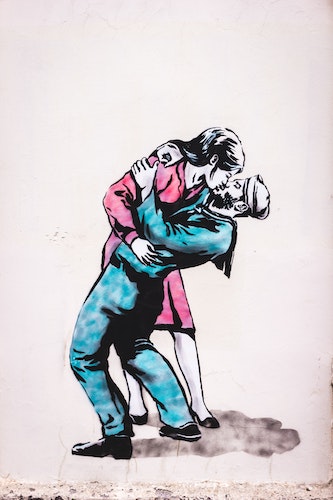
Assistant Editor Haley Crigger: I want to start this post by acknowledging that romance writing doesn’t especially need my defense: first, the genre is hugely successful and wouldn’t benefit much by concerning itself with the standards of “literary fiction”; second, for those who are interested in the literary and cultural significance of romance writing, there are projects like Sarah Wendell and Candy Tan’s Smart Bitches, Trashy Books; and lastly, I’m reluctant to “take the bait,” painstakingly blogging about why something is “serious” when dominant cultural notions of “seriousness” are problematic at best. What I’m calling a defense of wish fulfillment, romance, and fantasy began more as a curious meditation on desire, its complex wiring, and what possibilities arise when a story prioritizes desire over “reality.”
Desire is fluid. It receives its shape, morphing across cultures, across bodies, across single moments in time. It’s a child in a department store, touching everything in every dimension: furniture, the color red, when this is all over, each other, clarity, a lost feeling, freedoms we have never tasted, tools that do not yet exist.
Desire is fluid, and neoliberal American capitalism thrives on our being disconnected from its depth and dynamism. Rather than anticipating our desires, branding and advertising agencies fabricate them, creating visual stories that inspire the feeling of a lack, of a need, of a desire for this thing we just found out exists. Moreover, simulated desire is the fuel of consumerism, the Western economy, the way of life that our planet will not be able to sustain for much longer.
I like writing about desire. I don’t like writing words like “moreover,” or rehashing cold, harsh facts of “reality.” I don’t particularly enjoy reading them, either. Scanning the headlines, dread rises in my gut; my eyes cross; the saliva thickens in my mouth; I make an ugly, guttural noise that frightens my dogs off the couch. What most people refer to as “a dose of reality” is usually either very old news—like the ills of consumerism—or new and overwhelming, terrible news. Often and incredibly, reality is boring and terrifying at the same time.
What I’ve been wondering recently, then, is why authorial desire has been so resolutely placed on the literary no-no list. When dominant scholarship concedes that our understanding of “reality” is made up of received narratives, why are we so addicted to its cynicism? Why are writers trained to distrust our desires (and our darlings)? And what possibilities arise when a story prioritizes desire over “reality”?
As a genre that embraces desire, the romantic comedy has helped me to form answers to these questions. (By comedy, I mean a romance that ends with a happily-ever-after, or HEA). In this series of blog posts, I want to examine how the genre conventions of the romance tap into the narrative current between past, present, and future, which contemporary works are leading the way, and what they can teach us about narrative possibility.
The Genre Conventions
At the ground level, the genre conventions of romance dictate that the plot focuses on the courtship and HEA of one or more couples. Naturally, these stories tend to follow a similar narrative pattern. In The Natural History of the Romance Novel, Pamela Regis breaks down these genre conventions into eight narrative elements:
- Society defined
- The meeting
- The barrier
- The attraction
- The declaration
- The ritual death
- The recognition
- The betrothal
Importantly, before the story arrives at the HEA, the couple must first experience some disruption to their relationship that seems impossible to overcome: this is the point of “ritual death.” The barrier, having defeated the couple’s happiness, can only removed by the revelation of new information, or through an epiphany that leads to a personal breakthrough: The night watchman reveals Don John’s evil plan, and Hero’s good name is cleared; Elizabeth learns about Mr. Wickham’s poor treatment of Georgiana, and she realizes Mr. Darcy had been the honorable one all along; Andie Anderson publishes her latest article, “How to Lose a Guy in 10 Days,” revealing that although her relationship with Ben relationship had been an assignment, she was willing to tell the world that she had truly fallen in love with him. In the end, love emerges triumphant
Because any conflicts that arise are resolved with the HEA, fate and chance seem suspiciously on the heroes’ side. We enter, perhaps without immediately realizing it, what Northrop Frye refers to as an “idealized world,” that sticky sweet departure from what we know as cause-and-effect. It’s only in this other world that one woman’s coital silhouette is mistaken for another’s; that two extremely wealthy men fall in love with poor but charming sisters at a county ball; that an arrogant ad man is pressured to commit to a fake relationship with an impossibly beautiful disillusioned journalist.
These stories feel unrealistic, but they are not categorically impossible, and this space between improbable and impossible is where fantasy and wish fulfillment enter the narrative. Outside of the romance genre, fantasy has a long history of using this space to envision new ways of being within an oppressive world. For marginalized communities, the artistic exploration of an unbound past, present, and future is a method of liberation.
Romance author Alyssa Cole shows us how romance novels and historical fiction can tap into similar possibilities. Her novel An Extraordinary Union (Kensington, 2017) tells of a steamy romance between a formerly enslaved woman and a white man, both serving as Union spies in the American Civil War. Although the story seems unlikely, heroes Elle Burns and Malcolm McCall are based on real people: Mary Bowser and Timothy Webster. In her invention of their love story, Cole intentionally eschews the fetishism that dominates narratives of historical (and contemporary) interracial love stories. Malcolm is empathetic, genuine, and extremely aware of the power imbalance in the relationship. The couple takes this power differential seriously and discusses its impact on their relationship, the reward for which is, of course, true love and unbelievably hot sex.
Is the success of this relationship improbable for the time period? Sure. But to Cole, the space between improbable history and impossible history is a living, powerful document. As she explains in her interview with Jezebel,
There are so many people of color here. We all got here somehow. And I’m sure it wasn’t all misery for every single one of our families. So here in the United States, things weren’t always great—understatement!—but even in terrible times, people always manage to find some form of happiness and there are happy stories that can be found in real history.
For Cole, romantic fantasy is a space to open up the overwhelmingly traumatic dominant narrative of Black suffering during the American Civil War and judiciously ask: what would it take for this relationship to work? Unlike sanitized versions of history, novels like An Extraordinary Union uncover happy endings while engaging honestly with systems of oppression, a narrative feat that simultaneously betrays its defiance against the State. What results is a wonderfully improbable, three-dimensional, steamy story about a Black woman finding—and thoroughly enjoying—sexual autonomy and unconditional love against all odds.
As a writer, I am inspired by Cole’s insistence that these stories exist, and that our improbable desires are worth paying attention to. Nonmimetic representations of the world, even and especially when they engage our desires, are access points to the live connection between our received narratives, present circumstances, and future possibilities.










